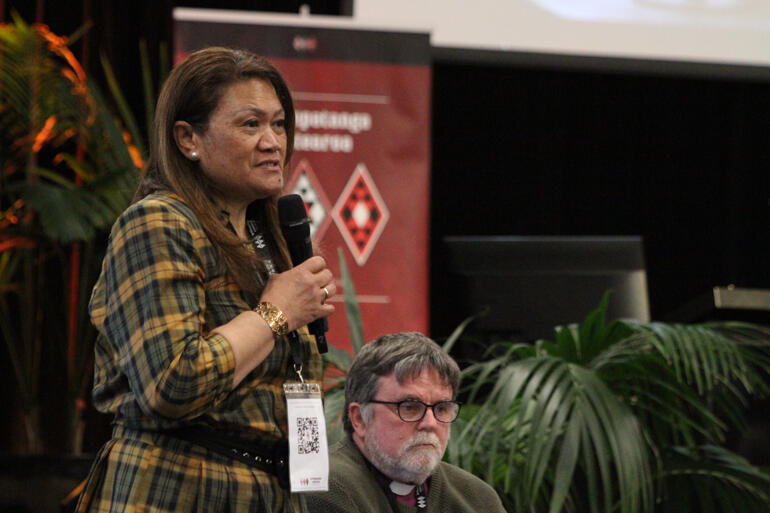A motion acknowledging the pain experienced by survivors of abuse within Church-based care, and seeking to restore their mana and tapu, was passed unanimously at Te Rūnanganui 2023 on Friday 29 September.
Te Rūnanganui 2023 has passed a motion that acknowledges the pain experienced by survivors of abuse, the hara of Te Hāhi, and commits Te Pīhopatanga to seek the restoration of survivors’ mana and tapu.
Archbishop Don welcomed three speakers to the motion to support Te Rūnanganui’s deliberations last Friday, who shared their experiences of working with abuse survivors and the Royal Commission, and developing child safety protocols.
He reminded Te Rūnanganui that when the Royal Commission of Inquiry into Abuse in Care had set out to investigate historic cases of abuse within state care, the Anglican Church and Roman Catholic Church had requested the scope be widened to include faith-based institutions.
“We want to understand, we want to change, and we want to reframe how we respond to survivors of abuse and the way that we keep our spaces safe,” said Archbishop Don.
Āwhina whānau expert and Primate’s Commissary for Reconciliation and Restoration Hera Clarke (Te Aupōuri, Ngāpuhi, Ngāti Porou) was first to speak from her many years’ experience working with sexual abuse survivors and their whānau.
Hera’s overarching message was a plea to the 160 laity and guests gathered at Hastings’ Toitoi to make sure it could no longer be possible to sweep abuse under the rug.
“I’ve personally met with 273 of our people who have been raped.” she said. “We need to stop using other words, we need to say these people were raped.”
“Some are in excess of 80 years old and can still describe, in detail, what they experienced decades ago. We need to be speaking about this, and I encourage us to think deeply about it.”
Second speaker on the panel, Archbishop Philip Richardson began with a stark message for Te Rūnanganui.
“As a Church, we haven’t even listened to ourselves.”
Archbishop Philip recalled reading the contents of a dozen reports, written between 1970 and 2017 that revealed systemic failure to deal with abuse that had taken place within the Church. He observed how time and again, those who had a clear picture of abuse had raised their hands.
“They told the leadership of the Church, the synods, the amorangi, ‘We are not safe. Our children are not safe. Our women are not safe.’ And they made several recommendations to ensure that safety within our Church. And not one recommendation had been implemented.”
“We have failed. And two things have struck me as a result – 1) how deeply broken the lives of survivors of abuse have become. And 2), how they had every right to expect that, in our care, they would be cherished.”
Archbishop Philip shared how meeting survivors of abuse, listening to them, empathising with their grief and pain, and beginning to understand the ripple effect of sexual abuse through generations of their whānau, had become, “intensely personal”.
The third panellist was Diana Langdon who develops and promotes child safety systems in her role as Strandz Children and Family Enabler for Tikanga Pākehā. She spoke about her mission to bring about “a theology of safety, which I feel may have been missed by the Church. I want our young people to meet a God who is safe, who is kind.” she said.
She went on to ask, how would it be if the Church became the best – and the safest – place for our tamariki to be?
“When we have a safe church, nobody misses out,” she explained. “The only people who are disadvantaged are those who intended to do harm.”
As Archdeacon Susan Wallace put forward the motion, Archbishop Don Tamihere reiterated his commitment to its aims, “We wish to offer a better kauhau in response to survivors,” he said.
“Our responses need to be survivor-led. More often than not, when the Church has had to respond to issues of abuse, we have made that response about us. And we have created a multiplicity, a maze of doorways for a survivor to navigate in order to go to the Church and tell their story.”
The motion as follows was passed unanimously.
Te Pīhopatanga o Aotearoa: Royal Commission into Abuse in State and Faith Care
Te Rūnanganui Motion 2023
We acknowledge the pain of survivors and our hara and seek to restore the mana and tapu of survivors and whānau.
We as Te Pīhopatanga o Aotearoa make a commitment to transform our tikanga (practices and culture) to be a church that recognises and upholds the tapu and mana of all the people of God. In doing so we commit to principles including aroha, kotahitanga, manaakitanga and tika.
Ngā Pou
– Aroha: a loving approach
– Kotahitanga: a unified approach
– Manaakitanga: a mana-enhancing approach
– Tika: an evidence and mātauranga based approach
